Botswana bets on technology to save rural economies
- Published
WATCH: It takes a village: Botswana's villages are dwindling as people are forced into the cities for work
Botswana is home to one of the most stable and successful economies in the whole of Africa.
But most opportunities are based in the bigger cities and towns.
That has led to worries that small villages could face a lingering death unless there are moves to boost their economies.
The village of Mookane - 120km from the capital, Gaborone - is typical of many rural areas around Botswana.
Boisterous children, impeccably turned out in uniform, make their way to school. A handful of shops are open to sell basic everyday items.
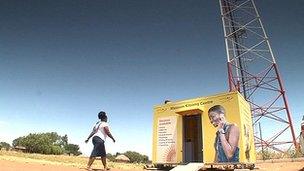
Kitsong centres have a telecommunications mast that links rural villages up to the rest of the world
The village has a population of 10,000. But where is everyone? During the working week, this is an eerily empty place, because much of the adult population lives and works in Gaborone.
Sense of identity
The village is an important part of a person's identity here. But the pull of economic advancement elsewhere is proving irresistible.
This is why the government has embarked on a public private partnership with the country's biggest mobile phone company, Mascom, to bring advanced data, web and voice services to 42 villages.
It's part of a wider programme to connect 197 villages to communication services.
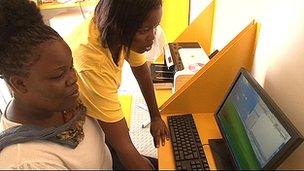
The centres are run by franchisees like Keolebogile Baatweng (right)
The government sees connectivity as a major socio-economic driver, and intends to make the most of the improved power supply in rural areas to bring 21st-Century services to remote villages.
Earlier attempts in some parts of the country were hampered when solar energy panels, powering local systems, went missing at an "alarming rate".
Today, so-called Kitsong centres are built to house computers, telecoms services and less hi-tech facilities, such as typing and fax machines.
It's run by a local entrepreneur on a franchise basis - and constitutes a sort of rural virtual office for other local businesses.
The aim is to provide services usually only available in town. Is it working in its aim of keeping more people home?
Farmer Vincent Christopher is just coming out of the centre. "I'm buying and selling cattle," he explains on the hot dusty road outside.
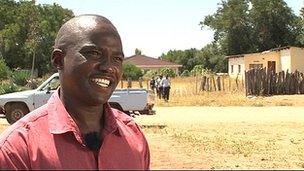
Farmer Vincent Christopher uses the centre to buy and sell cattle
"When I want to find out prices from the Botswana Meat Commission, I can just find out here over the internet. I can even communicate with customers from different places."
So he has saved himself a long, arduous, expensive journey to a distant town.
Student Melba is a regular customer at the centre, doing a distance learning course at a college in Gaborone. She has big ambitions.
"I'm looking forward to doing my degree and masters and I can still stay in this village " she explains. "I used to travel long distances to get services that are are rendered in this village."
So she believes that by being able to access an education from the comfort of her own village, she is helping to keep the place alive.
Urban v rural
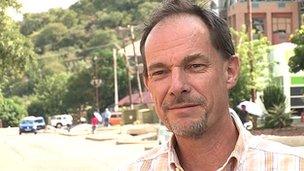
Economist Keith Jefferies doubts that people will stay in the country
But not everyone thinks that improving communication services in rural areas will help boost local economies and reverse the flow of people into the cities.
"For all sort of reasons, people prefer living in larger settlements," says economist Keith Jefferies.
"It's just the range of entertainment on offer and more interesting lifestyle. I'm a bit sceptical that people will stay in the rural areas."
Mascom's Tebogo Lebotse, not surprisingly, takes a different view. She says that village life has a real pull for most people in Botswana.
"We all very much love our village. What you can see as a trend is that at the weekend, every holiday everybody goes home."
Most people would rather spend more of their lives their home village than in town, she maintains.
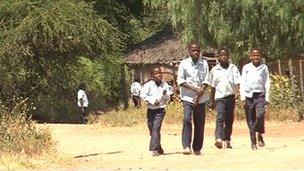
If the centres can help keep jobs in the villages, these boys may have a future here
"I truly believe that if there were more opportunities in rural Botswana, more people would want to set up businesses where they are from. There's more opportunity in the village, there's less competition."
The local Kitsong centre is planning to increase the suite of services it offers in order to meet rising demand.
So local businesses will be offered bulk-airtime deals and special rates for web connections.
The success of business expansion plans like this will determine whether the children now on their way home from school will be able to continue to call this village home.